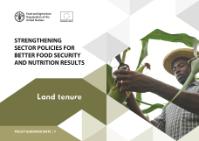Focal point
Location
The Food and Agriculture Organization of the United Nations leads international efforts to defeat hunger. Serving both developed and developing countries, FAO acts as a neutral forum where all nations meet as equals to negotiate agreements and debate policy. FAO is also a source of knowledge and information. We help developing countries and countries in transition modernize and improve agriculture, forestry and fisheries practices and ensure good nutrition for all. Since our founding in 1945, we have focused special attention on developing rural areas, home to 70 percent of the world's poor and hungry people.
Members:
Resources
Displaying 286 - 290 of 5074Особенности применения органических, минеральных, органоминеральных и зеленых (сидератов) удобрений в фермерских условиях
Настоящие издания, разработаны на основании материалов теоретических и лучших практик демонстрационных участков, созданных в рамках проекта Сельскохозяйственной и Продовольственной Организации Объединенных Наций и Глобального Экологического Фонда «Устойчивое управление горными лесными и земельными ресурсами в условиях изменения климата».
Strengthening sector policies for better food security and nutrition results. Land Tenure
Land, fisheries, forests and other natural resources provide a basis for livelihoods and social, cultural and religious practices. However, most people in rural areas in developing countries do not have any form of documentation to protect their land and natural resources rights, which puts their livelihoods and consequently their food and nutrition security are at risk. Secure tenure rights promote responsible investment in agriculture that could increase productivity and enhance food security and nutrition.
Sustainable Wildlife Management - Unasylva 249
Wildlife management is the focus of considerable international debate because of its importance for biodiversity conservation, human safety, livelihoods and food security. Local people have been managing wildlife for millennia, including through hunting. Sufficient examples are presented in this edition to show that sustainable wildlife management is also feasible in the modern era.
The Global Soil Partnership Factsheet
The Global Soil Partnership (GSP) factsheet provides quick facts and background information on the Partnership. The key achievements are presented giving an appealing visual of the work done to date.
Feeding people, protecting the planet
How to feed the world without degrading land and water resources, eroding biodiversity and contributing to climate change is among the greatest challenges of our times. FAO works with the Global Environment Facility (GEF) to support member countries in addressing the critical nexus between agriculture and the environment.
This booklet highlights a few success stories emanating from FAO's work with the GEF over the past two decades and presents an opportunity for member countries to further leverage from FAO's comparative advantages to create GEF-eligible development projects.










